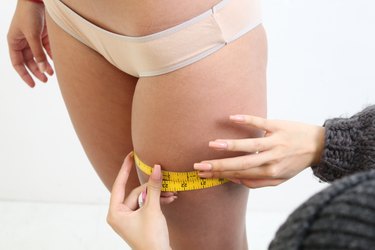
One of the biggest frustrations for women trying to lose weight is that certain areas of the body seem to stubbornly hang onto that extra padding no matter what. For example, before you manage to shave a couple of inches from your thighs and hips, you may find your breasts have lost half a cup size or more. What you're experiencing is the normal physiology of fat utilization and storage.
Shaped Like a Pear? Don’t Despair
Video of the Day
The physiology of fat storage is different between men and women. Men typically store extra fat around their waists, referred to as the apple shape. In addition to having a higher overall fat-to-lean ratio, women tend to store fat in their thighs and hips, the pear shape. Body image concerns aside, the pear shape offers a lower risk for cardiovascular disease and diabetes for both men and women.
Video of the Day
Built for Child-Rearing
These gender differences are designed to meet the demands of pregnancy and lactation. During and after pregnancy, fat stored in your thighs and hips is the primary source for the production of breast milk. In non-pregnant women, this thigh fat is protected and not easily mobilized. This means not only do your thighs and hips start out with more fat to lose, they are less likely to give it up than other parts of your body, such as your breasts.
Tissue Mass and Composition
Another reason it's harder to lose those inches from your thighs is simply a matter of tissue mass and composition. If you drop 5 pounds of weight and 3 percent in body fat, your thighs contribute a much smaller proportion to these losses. Your breasts contain relatively high percentages of fat and water compared to the rest of your body. Your thighs are much larger and include substantial amounts of muscle and bone in addition to fat tissue.
Think Fitness Rather Than Cup Size
The overarching goal of any weight-loss program should be improving your health, not just dropping a dress size or two. For example, regular exercise has been shown to significantly reduce the risk of breast cancer. If your weight-loss program includes exercise, as it should, your thighs may slightly increase in size due to muscle growth. To help compensate for a smaller cup size, you may be able to increase your bust measurement by including exercises that target the chest muscles.
- Human Kinetics: Excerpts -- Learn Why Women Carry More Fat Than Men
- PubMed: Abstract -- Evaluation of Fat in Breast Tissue Removed by Vertical Mammaplasty
- Scientific American: Why Does Fat Deposit on the Hips and Thighs of Women and Around the Stomachs of Men?
- Science Daily: Science News -- How Belly Fat Differs from Thigh Fat, and Why It Matters
- Stony Brook Medicine: General Breast Health